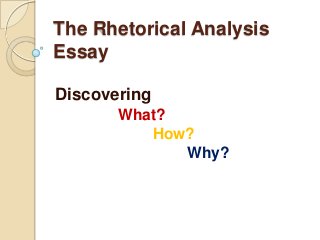The Rhetorical Analysis Essay
•Download as PPTX, PDF•
1 like•1,526 views
Report
Share
Report
Share

Recommended
Recommended
God is a creative God Gen 1:1. All that He created was “good”, could also be translated “beautiful”. God created man in His own image Gen 1:27. Maths helps us discover the beauty that God has created in His world and, in turn, create beautiful designs to serve and enrich the lives of others.
Explore beautiful and ugly buildings. Mathematics helps us create beautiful d...

Explore beautiful and ugly buildings. Mathematics helps us create beautiful d...christianmathematics
This presentation was provided by William Mattingly of the Smithsonian Institution, during the fourth segment of the NISO training series "AI & Prompt Design." Session Four: Structured Data and Assistants, was held on April 25, 2024.Mattingly "AI & Prompt Design: Structured Data, Assistants, & RAG"

Mattingly "AI & Prompt Design: Structured Data, Assistants, & RAG"National Information Standards Organization (NISO)
More Related Content
More from gswider
More from gswider (12)
Recently uploaded
God is a creative God Gen 1:1. All that He created was “good”, could also be translated “beautiful”. God created man in His own image Gen 1:27. Maths helps us discover the beauty that God has created in His world and, in turn, create beautiful designs to serve and enrich the lives of others.
Explore beautiful and ugly buildings. Mathematics helps us create beautiful d...

Explore beautiful and ugly buildings. Mathematics helps us create beautiful d...christianmathematics
This presentation was provided by William Mattingly of the Smithsonian Institution, during the fourth segment of the NISO training series "AI & Prompt Design." Session Four: Structured Data and Assistants, was held on April 25, 2024.Mattingly "AI & Prompt Design: Structured Data, Assistants, & RAG"

Mattingly "AI & Prompt Design: Structured Data, Assistants, & RAG"National Information Standards Organization (NISO)
Recently uploaded (20)
Measures of Central Tendency: Mean, Median and Mode

Measures of Central Tendency: Mean, Median and Mode
Measures of Dispersion and Variability: Range, QD, AD and SD

Measures of Dispersion and Variability: Range, QD, AD and SD
Basic Civil Engineering first year Notes- Chapter 4 Building.pptx

Basic Civil Engineering first year Notes- Chapter 4 Building.pptx
Explore beautiful and ugly buildings. Mathematics helps us create beautiful d...

Explore beautiful and ugly buildings. Mathematics helps us create beautiful d...
Mattingly "AI & Prompt Design: Structured Data, Assistants, & RAG"

Mattingly "AI & Prompt Design: Structured Data, Assistants, & RAG"
This PowerPoint helps students to consider the concept of infinity.

This PowerPoint helps students to consider the concept of infinity.
Russian Escort Service in Delhi 11k Hotel Foreigner Russian Call Girls in Delhi

Russian Escort Service in Delhi 11k Hotel Foreigner Russian Call Girls in Delhi
The Rhetorical Analysis Essay
- 2. First Steps Read the prompt. Read the prompt. Read the prompt.
- 3. Reading is a complex, recursive activity. • Annotate the prompt question. • Briefly bullet point what the prompt is asking you to do. • Most prompts require addressing the questions “What”, “How”, “Why”.
- 4. What? The interrogative pronoun “what” leads us to a basic yet sometimes formidable task: determining our personal reaction to a written text.
- 5. What is my reaction to the text I just read? Writers want to keep our attention. They want us to ask questions. Sometimes writers even disguise their own feelings on a topic to get us to think about, perhaps for the first time, our own predispositions.
- 6. (Re)Discovering our feelings. Rhetorical devices are word sounds or techniques which generate in a careful reader a particular effect. That effect, when coupled with a specific passage, is intended by the careful writer, to elicit or suggest or mimic a particular emotional response in the reader.
- 7. I feel, therefore… Noticing a reaction to a passage in the text is the first step. Pinpointing the cause of the reaction is the second step. Naming the rhetorical device responsible is a big third step.
- 8. How did that happen? Readers, alert to their own feelings while reading a text, are assumed to be curious enough to wonder how, on a perfectly beautiful day, out of nowhere, a feeling of irritation, for example, clouds their minds. The explanation lies with the author’s clever manipulation of the text. In some way a passage has elicited, stimulated, the response of “irritation”.
- 9. The quest for “how” begins. • Line by line, examine the word order (syntax), diction, sentence complexity, and specific sentence patterns. • Listen to the passage to discover sound variations caused by the placement of consonants or vowels in a line. • Look for the repetition of words at the beginnings or ends of lines. • Locate humor, sarcasm, or any other tactic in the sentences.
- 10. But, why? The analysis runs its course only after the author’s purpose is addressed. The feelings and responses churned up in the reader amount to mere manipulation unless the writer had a reason. What did the writer want us to see again? Think about again?
- 11. Concluding Remember, emotions connect us to our past. The author wants us to revisit some event in our past and decide if we have changed at all since then. Or, are we repeating only by habit, by tradition, by laziness what we have always done or thought?